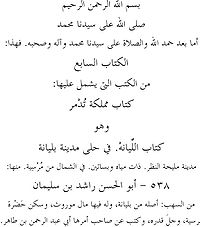Ibn Sa'id al-Maghribi

Ali ibn Musa ibn Said al-Maghribi (Template:Lang-ar) (1213-1286)[1] was a famous geographer, historian and the most important collector of poetry from al-Andalus in the 12th and 13th centuries. Ibn Said was born at Alcalá la Real near Granada, grew up in Marrakesh, studied in Sevilla and stayed in Tunis, Alexandria, Cairo, Jerusalem and Aleppo. He died in Tunis or Aleppo in 1275 or 1286.
Ibn Said al-Maghribi was an indefatigable traveller, profoundly interested in geography. In 1250 he writes Kitab Bast al-Ard. His Kitab al-Jughrafiya (Geography) embodies the experience of his extensive travels in the Muslim world and the shores of the Indian Ocean. He also gives an account of parts of northern Europe including Ireland and Iceland. Ibn Said also visited Armenia and was at the Court of Hulagu from 1256 to 1265.
His Rayat al-mubarrizin waghayat al-mumayyizin (Banners of the Champions, also translated as Pennants of the Champions), published in 1243, is his best known anthology of poetry. He also wrote a history of the region called Al-Mugrib fī ḥulā al-Magrib (Book of the Maghrib).[2]
In the Pennants of the Champions, poetry is arranged according to home and occupation of the writer. Lyrics come from all over the Andalusian world: Alcalá, Córdoba, Granada, Lisbon, Murcia, Saragossa, Seville, Toledo, and Valencia. Authors include bureaucrats, gentlemen, kings, ministers, and scholars; the book is evidence of how important love poetry was to the educated of al-Andalus. It is also one of the few historical remains of love between men from the period.
An excerpt from a poem of the Pennants:
His work stool (as if it were a horse)
carries him proudly (as if he were a hero).
But this hero of mine is armed only with a needle,
long like his eyelashes and like them shining.
Watching it stitch up the seams of a cloak
I think of the falling star trailed by a silken thread of light.
He twists the thread and the thread twists about my heart.
O that my heart could follow him, close like the thread behind the needle!
Poetry such as this would have a huge influence on the chivalric ideas of medieval Europe, although European chivalry was very strictly limited to love between men and women.
Works
Notes
- ^ Fernandes, Maria Alice (2006-12-12). "A viagem de Ibn Ammâr de São Brás a Silves" (PDF) (in Portuguese). Associação Campo Arqueológico de Tavira. Retrieved 2007-12-16.
{{cite journal}}: Cite journal requires|journal=(help); Unknown parameter|coauthors=ignored (|author=suggested) (help) - ^ "Ibn Said: Book of the Maghrib, 13th Century". Internet Medieval Source Book. Fordham University Center for Medieval Studies. Retrieved 2007-12-16.
References
- Ali Ibn Musa Ibn Said al-Magribi und sein Werk al-Gusun al-yaniafi mahasin su ara al-miça as-sabia by M. Kropp, in: Islam (Der) Berlin, 1980, vol. 57, no1, pp. 68–96 (2p.)
- His history of the world and islamic literature: ms. Escorial 1728. edition by Ibrahim al-Ibyari (2 vol.), Cairo 1968
- Homosexuality and Civilization by Louis Crompton ISBN 978-0674011977
- The Banners of the Champions: An Anthology of Medieval Arabic Poetry from Andalusia and beyond, by Ibn Said al-maghribi by James A. Bellamy, Patricia Owen Steiner, Ibn Said al-maghribi
- The Banners of the Champions of Ibn Said al-Maghribi, translated by James Bellamy and Patricia Steiner (Madison: Hispanic Seminary of Medieval Studies, 1988)
